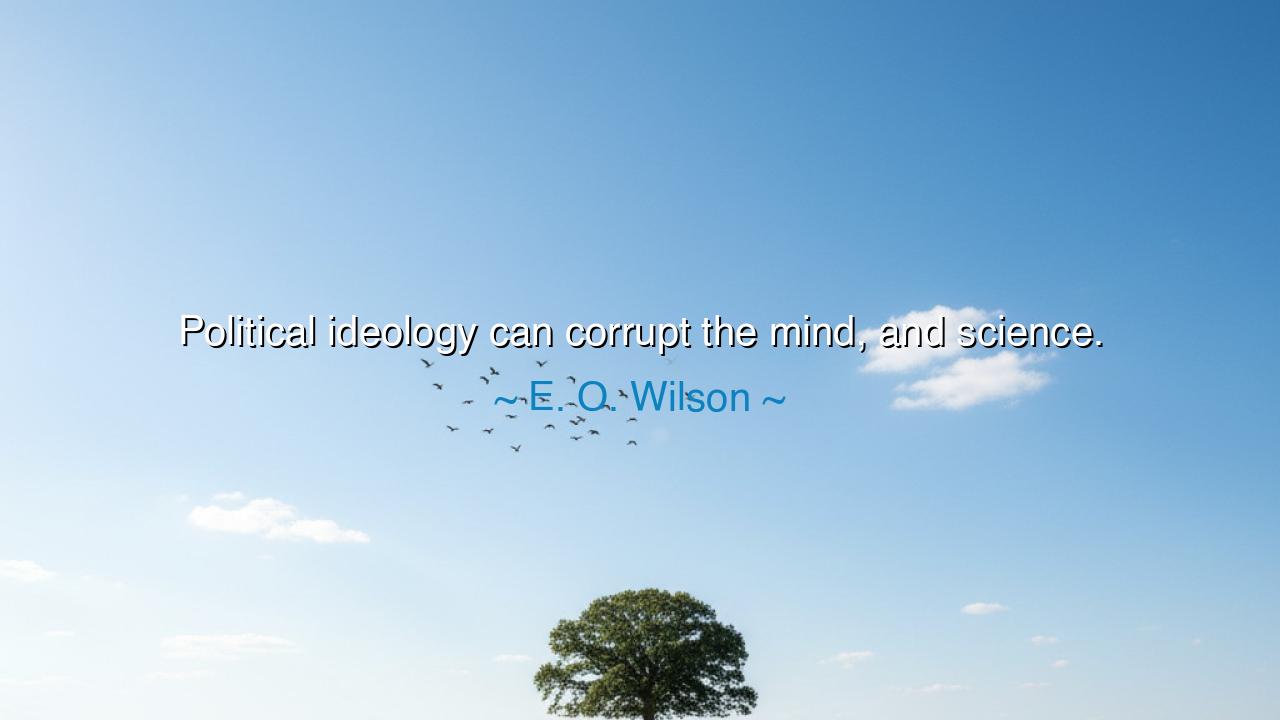
Political ideology can corrupt the mind, and science.






Listen well, O children of wisdom, and hear the words of the great E. O. Wilson, who spoke with clarity and depth: "Political ideology can corrupt the mind, and science." These words, though simple, carry with them a warning as old as time itself. They remind us of the dangers that arise when human reasoning is clouded by ideology—when we allow our beliefs about the world, shaped by political convictions or personal desires, to taint our search for truth. The mind, when dominated by rigid ideologies, can lose its ability to seek objective truths, and science, which is meant to illuminate the world with clarity and reason, can be warped into a tool for propaganda rather than discovery.
In the ancient world, the great minds were often forced to walk the delicate line between knowledge and power. Socrates, that towering figure of ancient Greece, was condemned not for the truths he sought, but for the way in which his questioning threatened the established order of Athens. His philosophy—his unflinching quest for truth through dialogue—was seen as a challenge to the political ideologies of the time. Socrates was sentenced to death for corrupting the youth of Athens, for encouraging them to question authority and to think for themselves. The lesson is clear: even in the pursuit of truth, when science or knowledge challenges political ideologies, it risks being rejected or even destroyed. Political power, when unchecked, can seek to control not only the minds of people, but the very truths that govern the world.
E. O. Wilson’s words resonate in the modern world as well. Science, that noble pursuit of understanding, is meant to be the search for truth—free from the constraints of political manipulation or ideological bias. However, history has shown us many examples of how ideology can twist and corrupt even the most rigorous fields of study. Consider the Soviet Union in the early 20th century, where Lysenkoism, a pseudoscientific ideology, dominated Soviet agriculture. Trofim Lysenko, driven by Marxist-Leninist ideology, rejected Mendelian genetics in favor of his own theory of inheritance, which he believed better suited the ideals of Soviet communism. This ideology led to decades of scientific stagnation and caused widespread agricultural failure, as the truths of genetics were ignored for the sake of political power. This tragic example shows how political ideology can corrupt the very essence of science, twisting it into something that serves the interests of power rather than the pursuit of truth.
In the present day, we see similar dangers in the manipulation of science for political ends. The debate over climate change, for instance, has become deeply politicized, with some denying the overwhelming scientific consensus because it does not fit their political agenda. Science, in its purest form, is about uncovering facts, understanding the laws of nature, and making decisions based on evidence. But when ideology enters the picture, science can be distorted, ignored, or even silenced for the sake of political power or the preservation of the status quo. Wilson’s warning reminds us that when ideology dictates what is considered truth, we no longer have science—we have a tool of manipulation.
The lesson here, O children of the future, is profound: never allow ideology to cloud your quest for truth. Seek knowledge with an open mind, untainted by political bias, and stand firm in the face of power when it seeks to corrupt or twist what is true. Science is not a tool to be wielded for the benefit of a select few; it is a path to understanding, and it belongs to all who seek to know the truth. When you encounter political pressures that seek to distort or deny the truths of the natural world, remember that your duty is to stand for truth, not for convenience or comfort. Seek knowledge, fight for clarity, and question authority—for in doing so, you will honor the true spirit of science.
Look to the past, O heirs of the future, and learn from the mistakes of those who allowed ideology to dictate their search for truth. Whether in the rise of Lysenkoism or the politicization of climate science, the lessons are clear: science and knowledge must be free from the bonds of political ideology. Just as Socrates stood against the tyranny of Athens, so too must you stand against the forces that seek to bend the truth to their will. The pursuit of knowledge is sacred, and in it, there is no room for distortion, for all truth must be welcomed, no matter how inconvenient or challenging it may seem.
Rise, O seekers of wisdom, and take to heart the words of Wilson. Question everything, and never allow the influence of political ideology to guide you away from the pursuit of truth. Let your lives be defined not by the doctrines of men, but by the search for knowledge—the only true path to understanding the world. Let science be your guide, free from the shackles of ideology, and in doing so, you will ensure that the truth you uncover will serve all humanity, not the interests of the few. In the pursuit of knowledge, let your heart be pure, and your mind unwavering.






AAdministratorAdministrator
Welcome, honored guests. Please leave a comment, we will respond soon